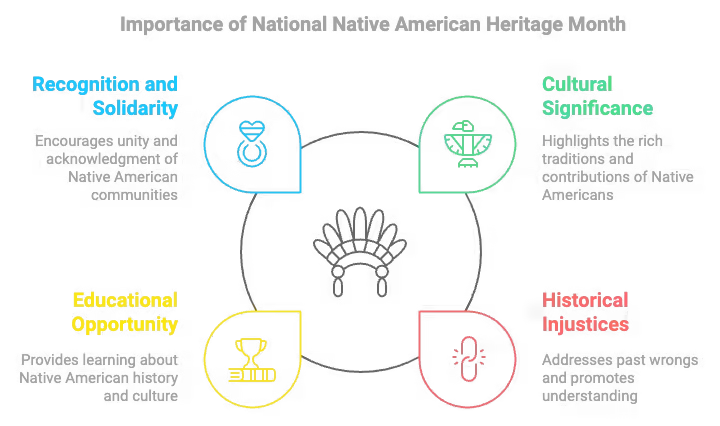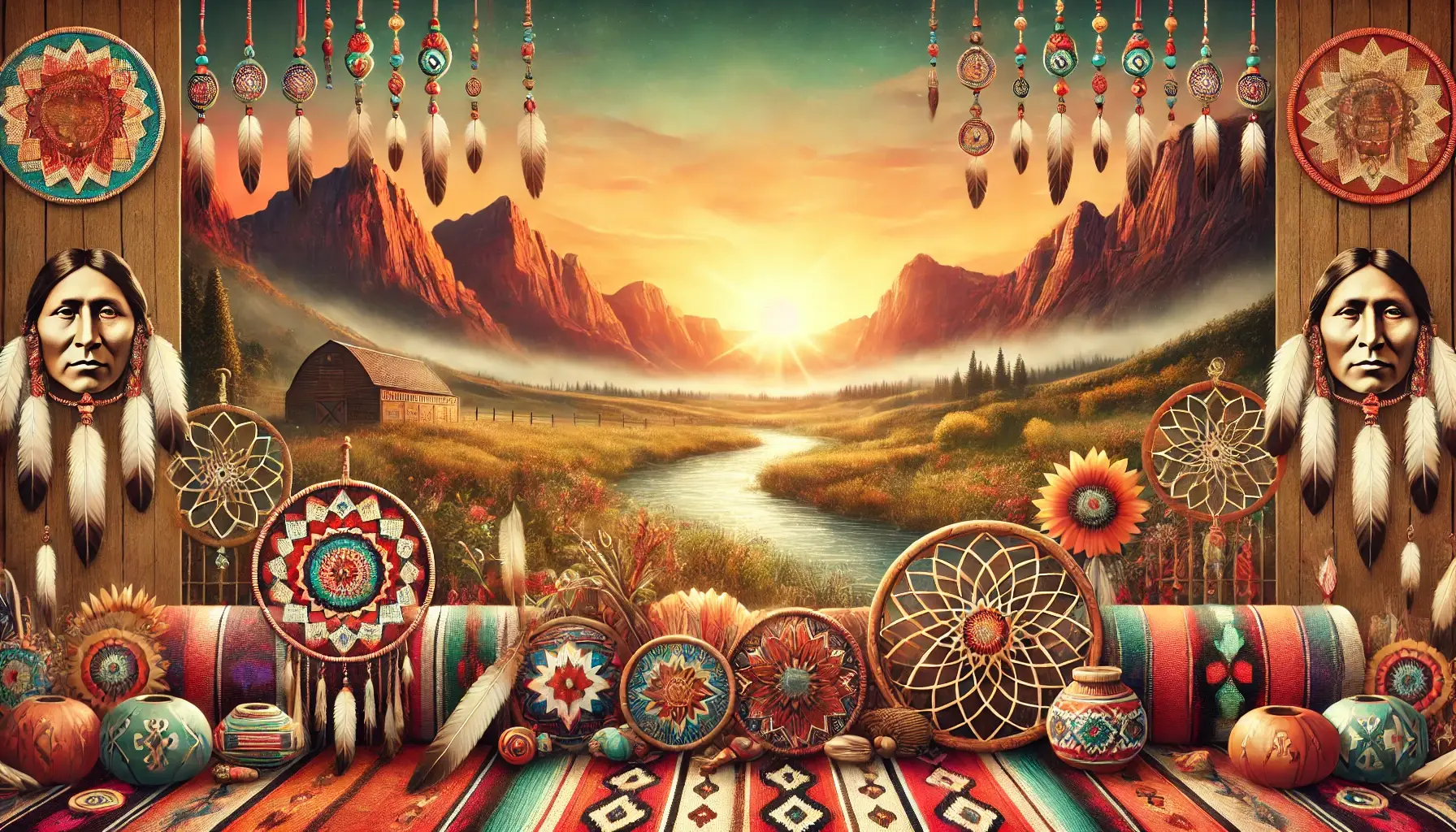Every November, the United States dedicates a month to honoring the rich histories, vibrant cultures, and invaluable contributions of Native American communities. Known as National Native American Heritage Month, this observance is more than just a celebration—it’s an opportunity for reflection, education, and connection with the first inhabitants of this land.
Why is this month so significant? It serves as a reminder to appreciate the resilience and enduring legacy of Native American peoples while encouraging everyone to learn and grow from their stories.
Whether through exploring cultural events, supporting Indigenous artisans, or educating oneself about Native history, this month invites all Americans to actively engage in preserving and celebrating Native heritage.
Historical Background
The journey to establish National Native American Heritage Month reflects a long-standing effort to recognize the profound contributions of Native peoples to the United States. The observance’s origins can be traced back to the early 20th century, with advocates like Dr. Arthur C. Parker, a Seneca anthropologist, who pushed for a day to honor Native American heritage.
In 1915, the American Indian Association formally approved a plan to celebrate American Indian Day. Progress was gradual, but in 1990, a significant milestone was achieved when President George H. W. Bush signed a joint resolution officially designating November as National American Indian Heritage Month.
Why November? This choice aligns with the season of harvest and thanksgiving, times deeply significant in many Native cultures. The month also allows reflection on the shared history of Native peoples and the United States, including both triumphs and challenges.
Since its designation, the observance has grown in prominence, with federal, state, and local organizations hosting events, educational programs, and cultural celebrations to honor the contributions of Native communities.
What is National Native American Heritage Month?
National Native American Heritage Month is observed every November in the United States to honor the history, culture, and contributions of Native American communities. Officially designated in 1990, this month celebrates Indigenous heritage through educational events, cultural activities, and advocacy for Native rights.

Why National Native American Heritage Month Matters
National Native American Heritage Month is far more than a symbolic observance—it’s a vital opportunity to honor the rich cultural tapestry, historical resilience, and ongoing contributions of Native American communities.
1. Cultural Significance
Native American tribes have profoundly shaped the cultural landscape of the United States. From languages and traditional practices to art and storytelling, their heritage forms a critical part of the nation’s identity. Celebrating this month ensures that these contributions are acknowledged and preserved for future generations.
2. Addressing Historical Injustices
Native American history is marked by resilience in the face of colonization, displacement, and systemic marginalization. Observing this month encourages reflection on these injustices and supports efforts toward reconciliation, equity, and cultural preservation.
3. Educational Opportunity
This observance provides a platform to correct misconceptions and dismantle stereotypes about Native communities. By fostering greater awareness, it helps create a more inclusive society that values the unique perspectives and histories of Indigenous peoples.
4. A Time for Recognition and Solidarity
Beyond history, Native Americans continue to play a crucial role in the arts, sciences, government, and activism. National Native American Heritage Month highlights their achievements while promoting unity and understanding across all communities.
By celebrating National Native American Heritage Month, we honor the resilience, creativity, and contributions of Native American communities, past and present. This observance challenges us to not only reflect on history but also to actively support efforts that uplift and preserve Indigenous cultures. It’s a time to learn, engage, and ensure that the stories and traditions of Native peoples remain a vital part of the American narrative.
Also Check out: Why Are Legos So Expensive? Find the Truth Behind the Price Tag.

Ways to Celebrate and Honor Native American Heritage
National Native American Heritage Month offers a chance to engage meaningfully with Native cultures, histories, and communities. Here are some ways to celebrate and honor this important observance:
1. Engage in Educational Activities
- Attend local events, such as museum exhibits, cultural festivals, or workshops focusing on Native American history and traditions.
- Watch documentaries or participate in lectures led by Native speakers to gain a deeper understanding of Indigenous perspectives.
2. Support Native-Owned Businesses and Artists
- Purchase handmade crafts, jewelry, or artwork from Native artisans to celebrate their creativity and craftsmanship.
- Explore Native-owned bookstores or shops for books and other cultural products.
3. Learn Through Media
- Read books by Native authors, such as Louise Erdrich or Joy Harjo, to explore storytelling deeply rooted in Native experiences.
- Listen to podcasts or watch films that highlight Native voices and tackle contemporary issues facing their communities.
4. Teach and Share Knowledge
- If you’re an educator, introduce students to Native American history and culture through curated lesson plans and classroom discussions.
- Share what you’ve learned with friends, family, or on social media to spread awareness and appreciation for Native heritage.
5. Participate in Advocacy and Giving
- Donate to Native-led nonprofits that support education, healthcare, or land preservation efforts.
- Advocate for Indigenous rights and policies that respect and protect Native communities.
Celebrate With Respect
While celebrating, it’s essential to approach this observance with genuine respect and cultural sensitivity. Avoid cultural appropriation and take time to understand the significance of traditions and symbols. Engaging authentically helps build bridges and demonstrates true appreciation.
Also Check Out: Blooket Hacks 2024: Ultimate Guide to Boost Your Gameplay Experience.

Contemporary Issues and Relevance
While National Native American Heritage Month is a time to celebrate and honor the past, it also shines a light on the present and future challenges faced by Native American communities. Understanding these issues is key to fostering solidarity and advocating for meaningful change.
1. Challenges Faced Today
- Land Rights and Sovereignty: Many Native tribes continue to fight for recognition of their land rights and the sovereignty promised to them in treaties. Issues surrounding pipeline projects and land usage often highlight these struggles.
- Health Disparities: Native communities face higher rates of health challenges, including diabetes and heart disease, exacerbated by limited access to healthcare in rural reservations.
- Cultural Preservation: Efforts to preserve Native languages, traditions, and customs face challenges due to systemic neglect and assimilation policies of the past.
2. Contributions and Achievements
- Despite these challenges, Native Americans are making significant strides across various fields. From activism and government leadership to arts, science, and sports, their impact continues to shape modern America.
- Notable figures like Deb Haaland, the first Native American U.S. Cabinet Secretary, exemplify the strides being made toward representation and empowerment.
3. Building Understanding and Progress
- Recognizing contemporary Native issues creates opportunities for collaboration and support. National Native American Heritage Month helps to amplify these voices, fostering a deeper understanding of how all Americans can contribute to creating equitable systems and preserving Native heritage.
A Forward-Thinking Perspective
This observance isn’t just about acknowledging history—it’s about envisioning a future where Native communities are celebrated, supported, and empowered. Recognizing their contributions and addressing ongoing challenges is a shared responsibility that can lead to a more inclusive and respectful society.
Conclusion
National Native American Heritage Month is a vital time to reflect on the histories, cultures, and contributions of Native American communities. It’s an opportunity to celebrate the richness of Indigenous heritage while acknowledging the challenges Native peoples continue to face.
By engaging with educational activities, supporting Native-owned businesses, and learning about contemporary issues, every American can play a part in honoring this legacy. Beyond the month of November, it’s essential to carry forward the lessons of respect, understanding, and advocacy for Native communities.
Let this month serve as a call to action—a reminder to learn from the past, celebrate the present, and contribute to a future where Native American heritage is preserved and respected as an integral part of the United States.
